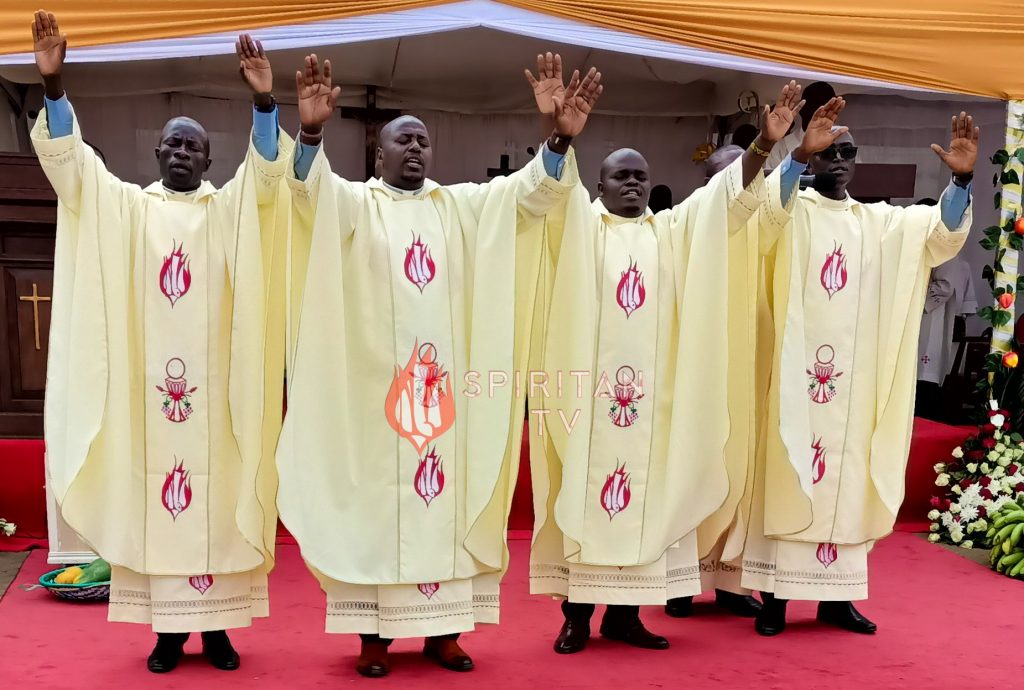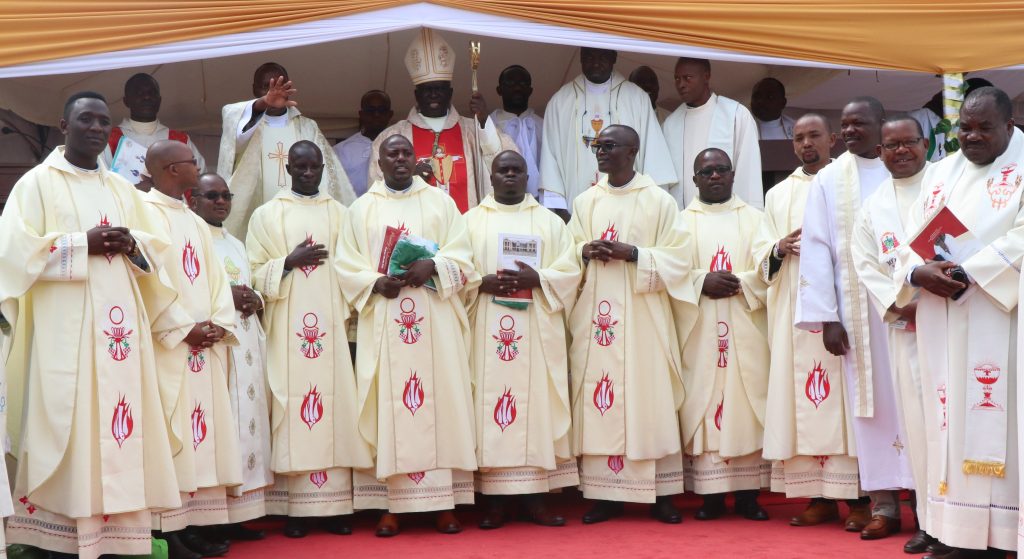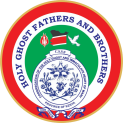formation
Formation is the work of God who forms us like a potter. It is a work of faith which transforms us. It requires continual discernment in order to answer the call we have received and allow the talents given to us by God to bear fruit.’ GSF N0 7. Formation in the Holy Ghost Fathers is a process whereby a candidate passes after feeling that God has called him to live a Spiritan Missionary Religious life to his death. Formation is an ongoing process. ‘Formation is the continual deepening of our ‘apostolic life’ under the influence of the Holy Spirit and in keeping with the spirit of our Founders, our living tradition, and the present needs of the world’ (SRL NO 100). There are two types of formation, initial formation and ongoing formation.
Vocation Promotion and Admission
VOCATION ANIMATION OFFICE
The office of Vocation is situated at the Spiritan Postulancy in Kilimambogo-Thika. The office does the work of coordinating and animating the young men who feel God is calling them in the Congregation. “Vocation animation consists in the fostering of awareness and the accompaniment of vocation to Spiritan life either as brother or as priest.” [GSF No45] Vocation animation brings question from young people such as “what should I do? Who are you?, where do you live?, what do you do? The answers are found only when we welcome them in the community for “Come and See” program.Spiritans we are Called, Consecrated , and Commissioned by the Spirit to the whole world.

VOCATION PROMOTION
Apart from the daily work, efforts are being made to ensure that many young men discern and submit an application to join the Congregation. We have printed new brochures and banner or posters are being prepared to ease publicity and efficiently support the action of animation. Together with other Animators from different Congregations in the umbrella of K.A.V.A (Kenya Association of Vocation Animators), we occasionally team up to and move from one secondary school to the other doing Vocation Promotion. We are invited in different dioceses and parishes to talk to the youth and also in different secondary and colleges in the country. It is a fruitful work.

CANDIDATE INTAKE
We continue to thank God for plentiful vocations to religious life in Kenya. The qualification to join the Congregation is, one has to be of 18-30 years old, a baptized Catholic of male gender. He has to be physically and emotionally healthy with a secondary School Certificate of grade C+ and above or Sufficient University or College qualifications. When a candidate has applied to join the Congregation then the Director of Vocations works hard to know him, to guide him in his desire and help in his discernment. This helps when time comes for the Spiritan formation.
CONTACTS
THE HOLY GHOST FATHERS (SPIRITANS) VOCATIONS PROMOTER KENYA PROVINCE P.0 B0X 14621 WESTLANDS 00800 NAIROBI
FR. STEPHEN OWAYA C.S.Sp Cell Phone +254707722570
iNITIAL FORMATION
Formations starts when candidates feels the call from God to serve Him in the Missionary Religious life.First stage is invitation in Postulancyfor come and see and then called to start One year in Kilimambogo . The student is introduced to the Spiritan life and the start of Missionary Religious life. This stage starts from September to May then candidates are sent to next stage. This first stage takes those candidates who have completed form four or college/ University studies and want to join Spiritan Missionary Religious Life.
The second stage is Philosophy stage which takes place in Arusha Tanzania for three years. This entire period that begins with Postulancy in Kilimambogo Thika to Arusha Tanzania is known as a Postulancy stage. This is a period of study of philosophy. The objective of this stage is aimed at allowing the candidate to come to a sufficient human and spiritual maturity in order to freely and responsibly enter the third stage of Novitiate.
Third stage is Novitiate stage. This stage takes place in Lushoto, Tanga-Tanzania and is one year course. The candidate deepens their sense of Vocation (SRL 110). “In their response to the Lord’s call, the novitiate guides them towards the moment when they will choose, freely and responsibly to consecrate their life to the apostolate in the Spiritan family or to opt for another way of living out their Christian life.” (GSFNO56). At the end of novitiate stage the candidate becomes the member of Spiritan family by professing the three vows.
The fourth stage is known as Period of Missionary Experience (PME) SRL N0 136.1-4. This stage takes two years. This stage is done in transcultural mission situation where Spiritans are working in the world. The objective of this stage is that ‘before taking up a professional activity, many young people undertake a time of internship or apprenticeship where good performance tis a necessary requisite before being taken on in full-time employment’ (GSFNO 69). This stage is very important to all confreres in the Congregation. After two years comes the fifth stage.
The fifth stage is Theology stage which takes four years in Nairobi Kenya. The objective of this stage is that ‘within the perspective of a life –long consecration to the apostolate this stage aims at giving the newly professed a sufficient maturity in all the areas required for Spiritan life.’(GSFNO62). Theology stage is a time of deepening spiritual and religious commitment with a missionary spirituality which includes study, pastoral or professional work, in line Spiritan Missionary Religious life. This stage ends with final professional to the Congregation for brotherhood and ordination to priesthood for those who take priesthood life
Spiritan House of Formation, Nairobi was founded in the 1970s by the Congregation of the Holy Spirit as the formation house for the second cycle of formation for the Eastern African region (Now Union of Circumscriptions of Eastern Africa, UCEAF).Being the scholasticate of the UCEAF, most of the scholastics are from the Circumscriptions of Kenya, Uganda, Tanzania, and Ethiopia. There is also a significant number of scholastics from the Provinces of Madagascar, Nigeria, Ghana, Sierra Leone, Gabon, and India. Today, Spiritan House is one of the biggest formation houses of the congregation with an average of 40 scholastics a year.
The purpose of the Scholasticate is to enable the young professed continue their initial formation. It is a period of strengthening and growing in the awareness of and commitment to the Spiritan religious missionary vocation. The program of formation is a holistic one, giving proper emphasis to the religious, academic and personal development of each scholastic. During this time, the young Spiritan allows himself to be assisted by his formators as he progresses towards the decision of making his definitive consecration to the apostolate by perpetual vows in the Congregation as a Brother or to prepare further for Ordination to the priesthood in the Church.
| Name | Nationality | Circumscription of Origin | Year of Study |
| KIYAGA Julius | Ugandan | Group of Uganda | Year 1 |
| MBOULOU-MBOULOU Urich | Gabonese | Province of Gabon | Year 1 |
| MBOUP Didier | Gabonese | Province of Gabon | Year 1 |
| RAKOTONIRINA Jean Marcello | Malagasy | Province of Madagascar | Year 1 |
| RANDIAMANANA Jean Rufin | Malagasy | Province of Madagascar | Year 1 |
| RANDRIAMANESY Simpenue | Malagasy | Province of Madagascar | Year 1 |
| ROSOLOFOAMANANA Mickael | Malagasy | Province of Madagascar | Year 1 |
| SSEMWOGERERE Paul | Malagasy | Province of Madagascar | Year 1 |
| DUYA John Frederick | Kenyan | Province of Kenya | Year 2 |
| IGBAWUA Matthew Yinamga | Nigerian | Province of Nigeria NE | Year 2 |
| KIVUMBI Deus | Ugandan | Group of Uganda | Year 2 |
| KWIYEGA Bartholomew Silvester | Tanzanian | Province of Tanzania | Year 2 |
| MARFO Joel Yeboah | Ghanaian | Province of Ghana | Year 2 |
| MUEMA Patrick Ngei | Kenyan | Province of Kenya | Year 2 |
| SEBASTIKKANNU Samikannu | Indian | Spiritan Community India | Year 2 |
| KIILU Michael Kasia | Kenyan | Province of Kenya | Year 3 |
| KIOKO Urbanus Kithuka | Kenyan | Province of Kenya | Year 3 |
| KOROMA Emmanuel Bartholomew | Sierra Leonean | Province of Sierra Leone | Year 3 |
| KWEYAMBA Respicius | Tanzanian | Province of Tanzania | Year 3 |
| LIPPO Anthony William | Sierra Leonean | Province of Sierra Leone | Year 3 |
| MAGASHI Samuel | Nigerian | Province of Nigeria NE | Year 3 |
| MUMO Urbanus | Kenyan | Province of Kenya | Year 3 |
| OTIENO Ronald | Kenyan | Province of Kenya | Year 3 |
| RATEMO Henry Omwoyo | Kenyan | Province of Kenya | Year 3 |
| SEREKA Francis | Ugandan | Group of Uganda | Year 3 |
| SSEBBUNZA Damian | Ugandan | Group of Uganda | Year 3 |
| AMPONSAH-BOATENG Isaac | Ghanaian | Province of Ghana | Year 4 |
| ANDRIANOROMANDIMBY Jean Luc | Madagasy | Province of Madagascar | Year 4 |
| JUANA Benjamin | Sierra Leonean | Province of Sierra Leone | Year 4 |
| KIGGALA Jude | Ugandan | Group of Uganda | Year 4 |
| LUDOVICK Karol Shirima | Tanzanian | Province of Tanzania | Year 4 |
| MUGALULA Denis | Ugandan | Group of Uganda | Year 4 |
| RAKOTONIRINA Daniel | Malagasy | Province of Madagascar | Year 4 |
| SSEKWEYAMA Rocco | Ugandan | Group of Uganda | Year 4 |
Spiritan House is a formation community which differs from an “ordinary working community”. The scholasticate aims to meet the following goals:
- To have an in-depth study into the Spiritan way of life as one pursues studies.
- To focus more on personal identity and congregational identity.
- To graduate in theological studies.
- To make final commitment to the Spiritan apostolate.
- To be accepted into the order of Diaconate and Priesthood.
Internationality and inter-culturality define Spiritan house today. The scholastics and formators are from twelve different nationalities in Africa and Asia. They include, Congo DRC, Ethiopia, Gabon, Ghana, India, Ireland, Kenya, Madagascar, Nigeria, Sierra Leone, Tanzania, and Uganda. They come from diverse ethnic and cultural backgrounds and speak different language. Spiritan House is a place of encounter for nations and cultures where diversity is appreciated and celebrated. Our community is a testimony of what Spiritan community life and identity truly is. Our unity and harmony is a clear sign of the presence of the Holy Spirit in this Spiritan family. Though many and diverse, but one Lord.
Since its inception in the 1970s, Spiritan House has produced over 250 missionaries. Many of these missionaries are ministering in the five continents of the world. Spiritan House is really the power house of the congregation. The community is lively and dynamic. The energy and vibrancy of youth are clear sign of hope for the congregation now and in the future.
Spiritan House contributes to the mission of the local Church in many ways. We share our faith through weekend pastoral to the neighboring parishes and communities. Spiritan House combines prayer, study, manual work, pastoral outreach and the integral human growth.
The following are the confreres living at Spiritan House this academic year 2015/2016.
FORMATORS:
| NAME | NATIONALITY | CIRCUMSCRIPTION OF ORIGIN | POSITIION HELD | |
| Fr. Benedict Wambua | Kenyan | Kenya | Rector | |
| Fr. Gerard Nnamunga | Ugandan | Uganda | Vice Rector | |
| Fr. Peter Mulyanga | Ugandan | Uganda | Bursar | |
| Fr. Patrick Roe | Irish | Ireland | Spiritual Director |
- 1.1Number of students on Pastoral Experience Program (PEP).
| Name | Circumscription of Origin | Place of PEP/Stage/PME |
| AWALA Tewodros | Ethiopia | Ireland |
| BAHATI Valence | Tanzania | DR Congo |
| EDYELU Isaac | Uganda | Tanzania |
| EGESSA Michael | Uganda | Tanzania |
| HAILU Hagos | Ethiopia | Mauritius |
| ISIDORY Eric | Tanzania | Sycheles |
| KYOMUKAMA Ambrose | Uganda | Kenya |
| MANWA David | Kenya | Uganda |
| NYAENYA Thaddeus | Kenya | Ghana |
| OKONG’O Charles | Kenya | Madagascar |
ONGOING FORMATION
In our Spiritan Rule of Life (SRL) NOS 142-147 Calls all members to continue being attentive to call of God. This stage is for members who are in the vineyard of the Lord tending the sheep. Good shepherds needs energy to continue. “God’s call to come and work for the kingdom is not made to us just once for all. Our response has to be updated continually. So it is necessity for all of us to retain ourselves without fail if we are to remain true to our calling in the world and in the Church.”(SRL N0 142).
Ongoing formation is a necessity in this contemporary life. There is a need to acquire knowledge in this changing and challenging times. It allows Spiritans to continually update our response to God’s ongoing invitation to be faithful to the signs of time. Ongoing formation addresses our human growth, spiritual growth, our apostolic commitments, our religious life and life in total. Fundamentally, ongoing formation is undertaken mainly during our Annual Retreats and Sabbatical leaves.
Ongoing formation finds concrete expression in three main forums: Annual retreats (held here in Kenya in the last week of November), renewal courses and sabbaticals. This formation is based on a conviction that God’s call to come and work for the Kingdom is not made to us just once for all. Our response has to be updated continually. So it is a necessity for all of us to retrain ourselves without fail if we are to remain true to our calling in the world and in the Church.
Ongoing formation involves all aspects of our calling — human, spiritual, theological, professional and pastoral. It should help our thinking on our apostolic activities, our discernment of the signs of the times, and the changes of attitudes and of outlook that are imperative. Every member is earnestly exhorted to look for the support of a counsellor capable of helping him in his spiritual journey. Ongoing formation concerns, in equal measure, both the individual and the whole community. Consequently every member, community and circumscription, as well as the whole Congregation is expected both to participate in it and contribute to it.
The circumscription shall set up, independently or in collaboration with other organizations, regular renewal conferences or courses. Members are to be encouraged to take part in these. Superiors shall facilitate for each one, about once every ten years, a lengthy period of renewal to permit a real updating and a spiritual replenishment (F. ressourcement spirituel ).
The members, for their part, shall be concerned about their own renewal and keep themselves abreast of events as they develop in their home Church. Members who have spent some years in a culture different from their own and who, for health or other reasons, return to their home circumscriptions, are given a fraternal welcome. They are helped to fit in again, especially if they must take up an apostolate that is significantly different from the one they have been used to. The General Council has the duty of helping and encouraging the initiatives of major superiors to provide for ongoing formation.
The Congregation shall help ageing confreres to take up activities in keeping with their years and their capabilities, and to prepare themselves for retirement. To our older members and those in ill health, the Congregation will willingly and cheerfully offer its care, to enable them in patience and in faith to take up this different form of the one same mission the Lord chooses to entrust to them. The retirement years when lived in faith are a time of growth in grace, both on the human and the spiritual planes. They are also a grace given by the Lord to the whole Congregation. So as to be more competent to help retired confreres, those who bear the responsibility for communities shall keep in mind what medical knowledge tells us of the frailties as well as the strengths that are proper to this age of life.
